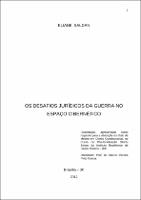Use este identificador para citar ou linkar para este item:
https://repositorio.idp.edu.br//handle/123456789/1223| Título: | Os desafios jurídicos da guerra no espaço cibernético. |
| Autor(es): | Saldan, Eliane |
| Orientador(es): | Garcia, Márcio Pereira Pinto |
| Palavras-chave: | Direito, Informática;Guerra Cibernética, Regulamentação;Guerra Cibernética, Conflitos;Guerra Cibernética, Direito Internacional;Armas Cibernéticas |
| Data de submissão: | 2012 |
| Citação: | SALDAN, Eliane. Os desafios jurídicos da guerra no espaço cibernético. 2012. 118 f. Dissertação (Mestrado em Direito constitucional).- Brasília, Instituto Brasiliense de Direito Público,2012. |
| Resumo: | O assunto da dissertação é a regulamentação da guerra cibernética. O objetivo da pesquisa foi examinar se os ataques cibernéticos constituem armas de guerra, bem como verificar a adequação dos atuais paradigmas do jus in bello e do jus ad bellum para disciplinar os conflitos no espaço cibernético, o palco de batalha do Século XXI que abriga infraestruturas críticas. Foi possível constatar que a aplicação das atuais regras da Carta da ONU e do Direito Internacional Humanitário exige critérios técnicos seguros para determinar a autoria e a origem de um ataque, bem como a necessidade e a proporcionalidade da resposta. Também foi possível verificar que, a despeito da inexistência de uma regulamentação específica, o Direito de Genebra, da Haia e de Nova Iorque, bem como os princípios, usos e costumes do Direito Internacional, a Cláusula Martens, os tratados e as normas internas servem para disciplinar a guerra cibernética, em especial no que diz respeito à proteção de bens e pessoas civis. Os principais limites são o princípio da distinção, da precaução e da vedação de ataques indiscriminados. Além disso, a participação direta de civis em hostilidades no espaço cibernético, se não balizadas pelas regras dos conflitos armados, pode acarretar a prática de crimes de guerra, sujeitos às jurisdições nacionais e à jurisdição do Tribunal Penal Internacional (observado o princípio da subsidiariedade), cujo Estatuto poderá, futuramente, ser alterado para incluir expressamente as armas e hostilidades cibernéticas. Enquanto não for possível um consenso internacional a respeito da guerra cibernética, além do Conselho de Segurança da ONU, o Comitê Internacional da Cruz Vermelha e a Corte Internacional de Justiça (embora sua vocação seja outra) podem exercer suas atribuições de interpretação para elucidar dúvidas e minimizar as lacunas a respeito das normas para a guerra cibernética. |
| Abstract: | The theme of the approach is the regulation of cyberwar. The objective of this research was to determine whether the cyber attacks are weapons of war, and to verify the adequacy of current paradigms of jus in bello and jus ad bellum to regulate conflicts in cyberspace, the scene of the battle of the XXI Century which houses critical infrastructures. It was found that the application of current rules of the UN Charter and International Humanitarian Law requires insurance technical criteria to determine the authorship and source of an attack, as well as the necessity and proportionality of the response. It was also observed that, despite the absence of specific regulations, the Law of Genebra, The Hague and New York and the principles, practices and customs of international law, the Martens Clause, international treaties and national norms serve to regulate the cyberwar, in particular as regards the protection of property and civilians. The main limits are the principle of distinction, precaution and sealing of indiscrimate attacks. Furthermore, the direct participation of civilians in hostilities in cyberspace, if not buoyed by the rules of armed conflict, can lead to crimes of war, subject to national jurisdiction and the jurisdiction of the International Criminal Court (observing the principle of subsidiarity) whose Statue may eventually be changed to explicitly include weapons and cyber hostilities. While it is not possible an international consensus about the cyber war, the International Committee of the Red Cross, the International Court of Justice (although its institutional role is another) and UN Security Council may exercise their powers of interpretation to clarify doubts and to minimize the gaps concerning the standards for cyber warfare. |
| Descrição: | Dissertação apresentada como parte dos requisitos para obtenção do título de Mestre ao Programa de Mestrado em Direito Constitucional do Instituto Brasiliense de Direito Público – IDP. |
| URI: | https://repositorio.idp.edu.br/123456789/1223 |
| Aparece nas coleções: | Mestrado Acadêmico em Direito Constitucional |
Arquivos associados a este item:
| Arquivo | Descrição | Tamanho | Formato | |
|---|---|---|---|---|
| Dissertação_Eliane Saldan.pdf | 613.88 kB | Adobe PDF |  Visualizar/Abrir |
Os itens no repositório estão protegidos por copyright, com todos os direitos reservados, salvo quando é indicado o contrário.
